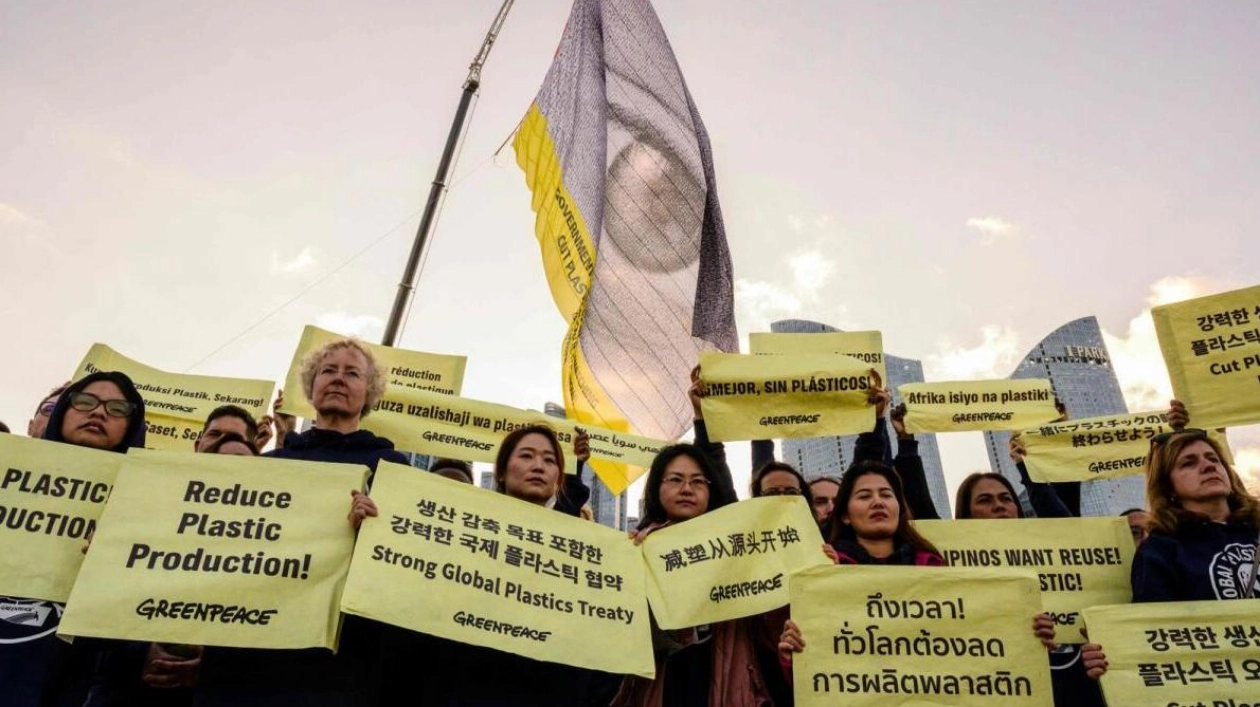A flag bearing an eye and the message “Governments, the world is watching, cut plastic production now” was hoisted above Greenpeace activists holding placards in Busan on November 25, 2024, just before the opening of the Fifth session of the UN Intergovernmental Negotiating Committee on Plastic Pollution at a nearby venue. – AFP
Every year, the world generates approximately 400 million tonnes of plastic waste, much of which is discarded after only a few minutes of use. Negotiations aim to establish the world's first treaty on plastic pollution this year. However, AFP discovered that single-use plastic remains highly popular across five diverse countries due to its affordability and convenience, highlighting the challenges ahead.
In Bangkok, customers queue for Maliwan's renowned traditional sweets. Steamed layer cakes, colored green with pandan leaf or blue with butterfly pea, are packaged in clear plastic bags alongside taro pudding in plastic boxes. The 40-year-old business uses at least two kilos of single-use plastic daily. “Plastic is easy, convenient, and cheap,” said 44-year-old owner Watchararas Tamrongpattarakit. Banana leaves, once standard, are now costly and difficult to source, and each must be cleaned and checked for tears, making them impractical for the business's pace of sales.
Thailand began limiting single-use plastic before the pandemic, urging major retailers to stop providing free bags. However, the policy has largely been ignored by street food vendors. Thailand produces two million tons of plastic waste annually, with the World Bank estimating that 11 percent is uncollected and ends up burned, disposed of on land, or leaking into rivers and the ocean. Watchararas attempts to consolidate purchases into fewer bags, and some customers bring their own reusable containers. Yet, long-time customer Radeerut Sakulpongpaisal finds plastic convenient despite understanding its environmental impact.
In Lagos, Nigeria, empty water sachets litter the Obalende market. Lisebeth Ajayi observes dozens of customers daily using their teeth to tear open bags of “pure water” and drink. “They don't have the money to buy bottled water, that's why they do the pure water,” said the 58-year-old, who sells bottles and bags of water, soap, and sponges. Water sachets, a major pollutant since the 1990s, remain popular for drinking, cooking, and washing. Lagos banned single-use plastic in January, but the impact remains minimal.
In Rio de Janeiro, vendors carry metal containers filled with the tea-like drink mate, dispensing it into plastic cups for beachgoers. “Drinking mate is part of Rio de Janeiro's culture,” explained Arthur Jorge da Silva, 47. He acknowledged the environmental impact of plastic cups but noted the difficulty in finding affordable alternatives. Plastic straws have been banned in Rio's restaurants and bars since 2018, and shops no longer need to offer free plastic bags, though many still do.
In France, single-use plastic has been banned since 2016, but plastic bags remain common. At Paris' Aligre market, stalls offer fruit, vegetables, and stacks of bags. Vendor Laurent Benacer uses a 24-euro ($26) box of 2,000 bags weekly. “In Paris, everyone asks for a bag,” he said. Alternatives like paper bags exist, but some customers are unconvinced.
In Dubai, plastic containers at Allo Beirut restaurant await filling and delivery across the city. “We receive more than 1,200 orders a day,” said delivery manager Mohammed Chanane. “We use plastic boxes because they are more airtight and better preserve the food.”
Source link: https://www.khaleejtimes.com






